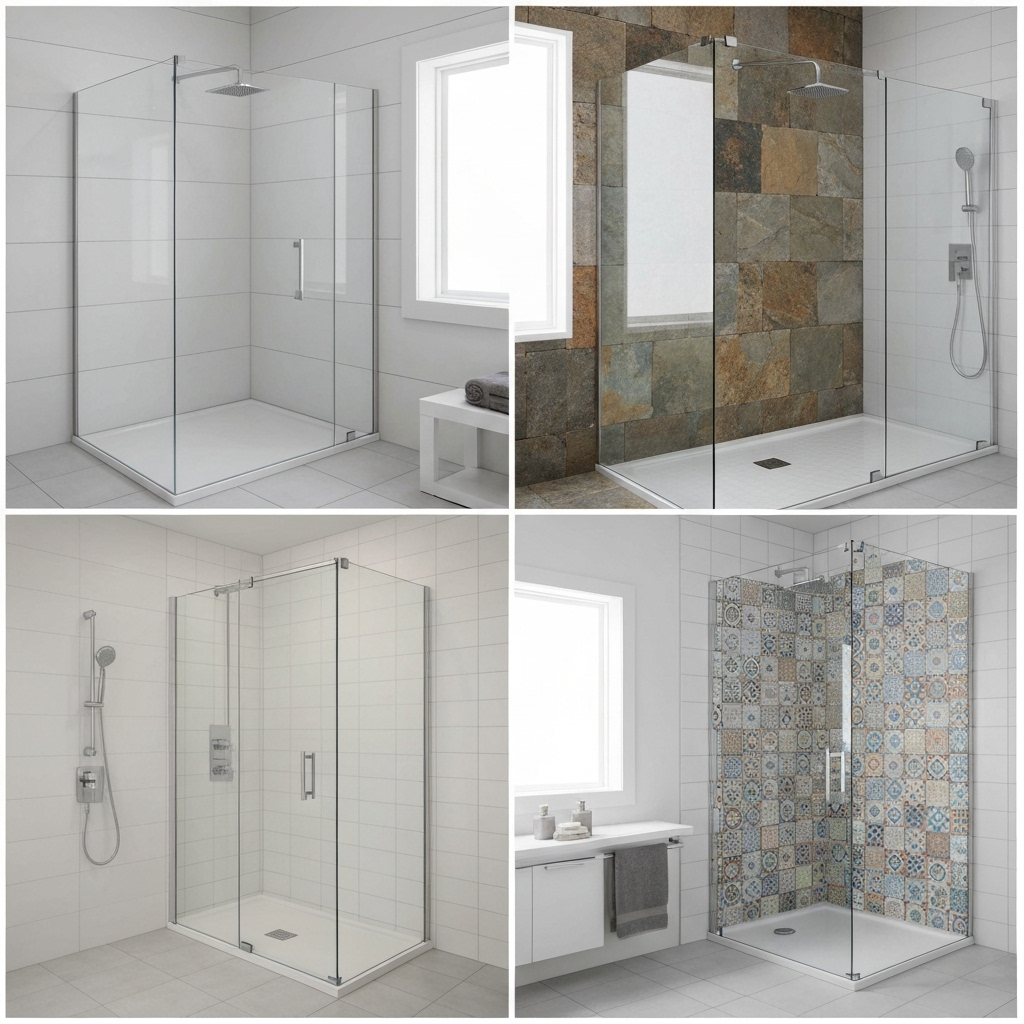Best Tiles for a Shower Enclosure: A Detailed Guide
When upgrading or building a shower enclosure, tile choice is one of the most important decisions. The right tile impacts durability, cleaning, and the overall look of your bathroom. Not all tiles perform the same under constant moisture, heat, and cleaning products, so understanding the strengths and weaknesses of each option is key.
Here’s a breakdown of the best tiles for shower enclosures, with details on why one may be better than another.
1. Ceramic Tile
Overview:
Ceramic tile is a classic and budget-friendly option. It’s made from clay, fired in a kiln, and often finished with a protective glaze.
Pros:
Wide range of styles, patterns, and colors.
Affordable and easy to install.
Glazed ceramic resists water and staining.
Cons:
More porous than porcelain, making it less durable in the long term.
Can chip or crack under heavy impact.
Verdict:
Ceramic is a good choice for a cost-effective shower renovation but may require more upkeep than porcelain. It’s better suited for walls than shower floors, where durability and slip resistance are more important.
2. Porcelain Tile
Overview:
Porcelain is a subtype of ceramic but denser, less porous, and fired at higher temperatures, making it stronger and more water-resistant.
Pros:
Highly water-resistant, almost waterproof.
Extremely durable—resists chips, scratches, and heavy use.
Can mimic natural stone, wood, or even concrete for a designer look.
Easy to clean and low-maintenance.
Cons:
Slightly more expensive than ceramic.
Heavier, so professional installation may be needed.
Verdict:
Porcelain is generally considered better than ceramic for shower enclosures. It’s more durable, less porous, and requires less maintenance—making it a smart long-term investment, especially in high-use bathrooms.
3. Natural Stone Tile (Marble, Slate, Travertine, Granite)
Overview:
Natural stone brings timeless luxury and unique character, as no two tiles are alike.
Pros:
Unique veining, patterns, and textures.
Adds a high-end, spa-like feel to the bathroom.
Durable if properly maintained.
Cons:
Requires regular sealing to prevent water penetration.
Can stain or etch from soaps, shampoos, or hard water.
Typically more expensive than ceramic or porcelain.
Verdict:
Natural stone looks stunning but requires more upkeep. Compared to porcelain, which can mimic stone without the maintenance, real stone is more about luxury and aesthetics than practicality. Best for homeowners willing to invest in both cost and care.
4. Glass Tile
Overview:
Glass tiles are sleek, modern, and highly reflective, which helps brighten smaller bathrooms.
Pros:
Non-porous, so they don’t absorb water.
Resistant to mold and mildew.
Reflects light, making small showers feel larger.
Available in many vibrant colors and finishes.
Cons:
Scratches can be noticeable.
Slippery if used on floors (better for walls or accents).
Installation is trickier—adhesive can show through if not done perfectly.
Verdict:
Glass tiles are better as accent pieces or feature walls rather than full coverage. They’re not as durable as porcelain on high-contact surfaces, but when used strategically, they add elegance and brightness.
5. Mosaic Tile
Overview:
Mosaics are made from small pieces of glass, ceramic, porcelain, or stone set into sheets. They’re popular for accent walls, shower niches, and floors.
Pros:
Flexible for curves, benches, and small spaces.
Naturally slip-resistant on floors due to many grout lines.
Offers unlimited design creativity.
Cons:
More grout means more cleaning and maintenance.
Can be costly depending on material.
Verdict:
Mosaics are best for shower floors and accents. Compared to large-format porcelain, mosaics require more upkeep, but they offer grip and style where needed.
6. Large-Format Tile
Overview:
Large tiles (12x24 inches or bigger) are trending in modern showers. They’re typically porcelain or ceramic.
Pros:
Fewer grout lines, which means easier cleaning.
Creates a sleek, contemporary look.
Can visually expand small showers.
Cons:
Heavier and more difficult to cut/fit.
Requires a perfectly even surface for installation.
Verdict:
Large-format porcelain is often the best option overall for modern shower enclosures. It combines durability, easy maintenance, and contemporary style better than smaller or more porous tiles.
Final Comparison: Which Tile is Best?
Best Overall: Porcelain – durable, waterproof, versatile, and low-maintenance.
Best for Luxury: Natural Stone – high-end and unique, but requires sealing and care.
Best for Brightness & Modern Flair: Glass – ideal for accents and walls.
Best for Slip-Resistance: Mosaic – perfect for shower floors.
Best for Contemporary Minimalism: Large-Format Porcelain – sleek and easy to clean.
Best Budget-Friendly Option: Ceramic – affordable but not as durable as porcelain.
Conclusion:
If you want a balance of durability, beauty, and low maintenance, porcelain tiles are the top choice for most shower enclosures. However, mixing materials—such as porcelain for walls, mosaics for floors, and glass for accents—often creates the most functional and stylish shower space.


